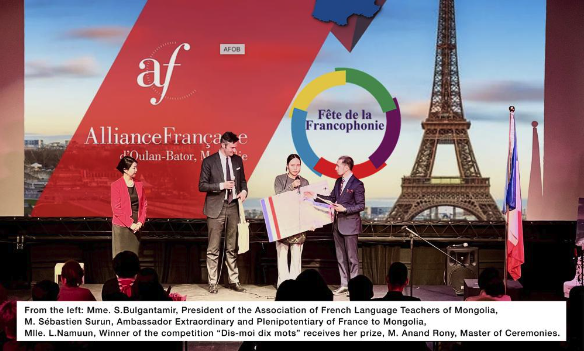French language, as a vehicle of culture and diplomacy, possesses a special combination of melodiousness and logic that structures thought and challenges critical thinking. The musicality of the French language has an elegant capacity to deliver powerful messages with lightness and grace. It is estimated that roughly over 400 million people speak French across North and South Americas, Europe, Africa, Southeast Asia, and beyond. No wonder, UNESCO gives prominence to French as its working language and promotes it by supporting Francophone cultures in different ways. The French language is like a key that opens doors to many countries.
On the occasion of the International Day of Francophonie on March 20, the French Alliance of Mongolia in collaboration with the Embassy of France and francophone partners widely organized a series of French language and culture events at various favorite cultural sights of Ulaanbaatar. For over two weeks, French language speakers and enthusiasts in Mongolia united in celebrating the richness in diversity of francophone cultures through music, theater, cuisine, literature, visual art, film, and more.
This year marked the 23rd time that the Festival of Francophone cultures was held in Mongolia. L’Alliance Française placed a great emphasis on youth and French language students, who actively participated in competitions of poetry, recitation, song, dictation, and composition. The first-place winners were awarded a week-long trip to Paris. The French language competitions contributed to the development of interest in French-language education for participants and helped viewers to expand their knowledge in different realms of culture, language, and art.
As Mongolian students stepped up to the challenge to showcase their talent and creativity on stage, the audience also cheered for the brave ones who persevered through mistakes until the very end. Overall, however, one could sense the necessity for the Mongolian education system to encourage more intellectual expression and creativity in schools instead of solely fixating on academic performance. In French culture, children are brought up from an early age to formulate their opinion, engage in debates over what is happening around them, and express freely how they feel. Such practices could serve well in developing the competitiveness of Mongolian youth in the future.
On the closing day, a festival gathered audiences for French music and opera at Sukhbaatar Square. Following the aftermath of the global pandemic, however, visitors were fewer than normally expected. Still, the cultural fair attracted a good number of individuals and united many like-minded people. Francophone organizations, institutions, restaurateurs, and businesses active in sectors of ecotourism, energy, agriculture, education and research, and science and technology partook in the fair. The windchill of a Mongolian spring day did not discourage participants from enjoying themselves under the sunny sky.
Relations between France and Mongolia go back to the 13th century, when French artisans, sculptors, and missionaries braved the cold and experienced the customs of people living across the Mongol Empire and made valuable contributions to the Mongolian cultural heritage and history. In modern times, France was one of the first developed countries to acknowledge Mongolia as an independent nation when the latter joined the United Nations in 1961. Currently, France continues to set an example as one of the leaders in strengthening the rule of law and combatting climate change in the world – both are vital issues for the development of Mongolia.
Francophone culture days are an important part of intercultural dialogue. They develop mutual understanding and create more harmonious relations among different cultures. The expression and awareness of the abundance of cultural diversity in society are significant markers of democracy and human rights. From Francophone days, we could reflect on new ways of celebrating cultural pluralism in Mongolia. Increased understanding and knowledge of diverse cultures raise the quality of life for a nation’s citizens. The enrichment of spirits and relationships for viewers, participants, and organizers also helps unite a nation.
In an era of globalization, intercultural dialogue plays a consequential role in protecting and treasuring cultural diversity. As information and technology bring human beings ever closer in contact with one another, the richness of identities shaped by a multitude of traditions and geographies thrives on open-minded communication. Intercultural dialogues serve as a proponent of peace. Lasting a few days, the cultural events might seem momentary when completed, but the impact on members of society can have lasting positive effects. They reduce negative stereotypes and prejudices that engender fear and conflict. Cultural days build trust and bring out kindness in people.
By Ariunaa Jargalsaikhan
Published in UB Post on March 30, 2022
Ulaanbaatar







